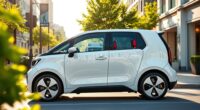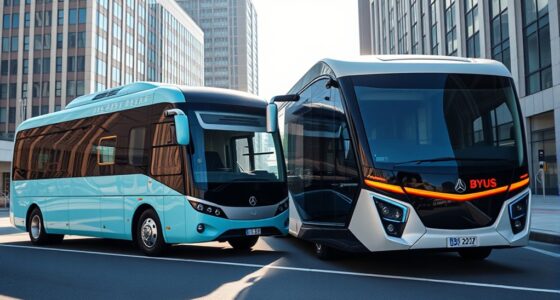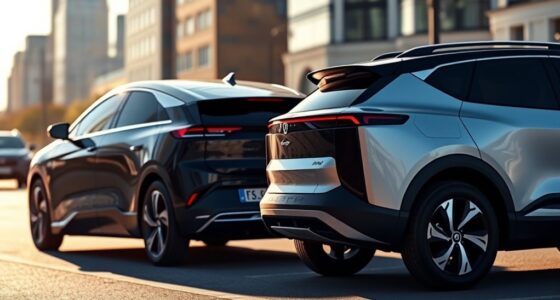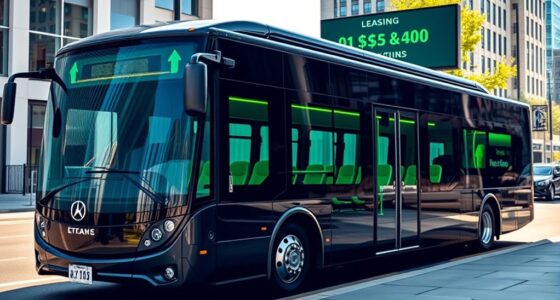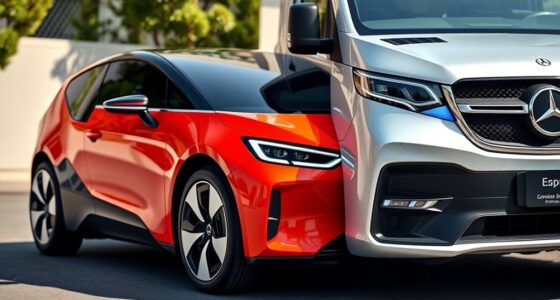If you’re choosing between heat pumps and resistance heating for electric buses, consider efficiency and range. Heat pumps transfer heat more effectively, saving energy and extending your bus’s operational distance, especially in cold weather. Resistance heating, while simpler and reliable, consumes more power, which can cut into battery life. Understanding these differences helps you select the best system for your needs, and if you keep exploring, you’ll find ways to optimize your bus’s performance even further.
Key Takeaways
- Heat pumps are more energy-efficient, reducing power consumption and extending bus range compared to resistance heating.
- Resistance heating offers simplicity and reliability but consumes significantly more energy, impacting battery life.
- Heat pumps require advanced control systems for optimal integration, while resistance heating is easier to implement.
- Cold weather increases energy demands for resistance heating, whereas heat pumps perform better across various temperatures.
- Choosing between systems depends on operational priorities like efficiency, system complexity, and maintenance considerations.

Electric buses are transforming public transportation by offering a cleaner and more efficient alternative to traditional diesel-powered vehicles. One of the key factors in maximizing their efficiency is how well their heating systems are designed, especially since heating can considerably impact battery life and overall performance. When choosing between heat pumps and resistance heating, understanding how each system interacts with your bus’s battery efficiency and system integration becomes vital.
Heat pumps stand out because they leverage existing thermal energy to generate heat more efficiently. Unlike resistance heating, which converts electrical energy directly into heat, heat pumps transfer heat from the outside air to the interior of the bus. This process consumes less energy, making it ideal for preserving battery life, especially during cold weather when heating demand is high. Since battery efficiency is directly tied to energy consumption, selecting a heat pump can extend your vehicle’s range by reducing the power drain associated with heating. Additionally, heat pumps integrate seamlessly with modern bus systems, allowing for more sophisticated control strategies that optimize energy use based on real-time conditions. This system integration ensures that the heating process works harmoniously with other electrical components, improving overall vehicle efficiency and reliability.
Heat pumps maximize efficiency by transferring heat from outside air, extending vehicle range and seamlessly integrating with bus systems.
On the other hand, resistance heating offers a straightforward, reliable solution but at a higher energy cost. It heats the interior by converting electrical energy directly into heat, which means it consumes more power from the battery. During cold conditions, this increased energy demand can considerably reduce your bus’s range and increase charging frequency. Resistance heating is less efficient in terms of energy use, but it’s simpler to implement and maintain, making it a dependable choice in environments where system integration and energy efficiency are less vital. However, if your goal is to maximize battery efficiency and extend operational range, resistance heating might not be the best fit.
When considering your options, think about how each system will fit into your overall vehicle design and operational needs. A well-integrated heat pump system can reduce energy consumption and improve battery efficiency, especially when paired with advanced control systems that adjust heating based on real-time data. This integration not only conserves energy but also enhances comfort for passengers and drivers alike. Moreover, understanding the types of heating systems available can help you make more informed decisions aligned with your operational goals. Ultimately, investing in a system that balances efficiency, system integration, and reliability will give you the best return, ensuring your electric bus performs effectively across various weather conditions and operational scenarios.
Frequently Asked Questions
What Is the Average Lifespan of Heat Pump Vs Resistance Heating Systems?
You can expect a heat pump to last around 15 to 20 years, thanks to its durable components and recent technological advancements. Resistance heating systems typically have a shorter lifespan, about 10 to 15 years, because their components may wear out faster. Proper maintenance and high-quality parts can extend both systems’ durability, but overall, heat pumps tend to offer a longer lifespan due to their robust design and improved efficiency.
How Do Initial Installation Costs Compare Between Heat Pumps and Resistance Heaters?
You’ll find that heat pumps generally have higher upfront expenses compared to resistance heaters. The installation costs for heat pumps are more significant because they require more complex systems, including outdoor units and refrigerant lines. Resistance heaters are simpler and cheaper to install, making their initial expenses lower. However, consider long-term savings, as heat pumps tend to be more energy-efficient, which can offset higher upfront installation costs over time.
Which Heating System Is More Environmentally Sustainable for Electric Buses?
Think of choosing a heating system like picking a green garden to grow. Heat pumps are more environmentally sustainable because they’re compatible with renewable energy sources and have a lower refrigerant environmental impact. They use less energy and emit fewer greenhouse gases compared to resistance heaters, making them a smarter choice for eco-conscious electric buses. By opting for heat pumps, you help reduce your carbon footprint while maintaining comfort efficiently.
What Maintenance Is Required for Heat Pump and Resistance Heating Systems?
You need to regularly inspect and clean your heat pump and resistance heating systems to maintain system efficiency and guarantee component durability. For heat pumps, check filters, refrigerant levels, and coils, and schedule professional servicing annually. Resistance systems require minimal maintenance but should have electrical connections checked periodically. Proper upkeep prevents breakdowns, extends lifespan, and keeps your heating systems running efficiently, saving you energy and costs over time.
How Do Operating Costs Differ During Extreme Weather Conditions?
During extreme weather, heat pumps typically operate more efficiently, reducing your operating costs despite potential cost fluctuations. Resistance heating, however, consumes more energy and becomes less cost-effective when temperatures drop sharply. You’ll notice higher energy bills with resistance systems in cold weather, while heat pumps maintain better operating efficiency. Consequently, your choice impacts ongoing expenses, especially during severe weather, with heat pumps offering more predictable and lower costs.
Conclusion
Choosing between heat pumps and resistance heating depends on your priorities. For example, imagine a city that switched to heat pumps on their electric buses, reducing energy costs and emissions considerably. With proper insulation and system design, heat pumps can keep passengers warm efficiently. Resistance heating may be simpler initially, but over time, the energy savings from heat pumps prove worth the investment. Ultimately, selecting the right system guarantees comfort and sustainability for your fleet.

